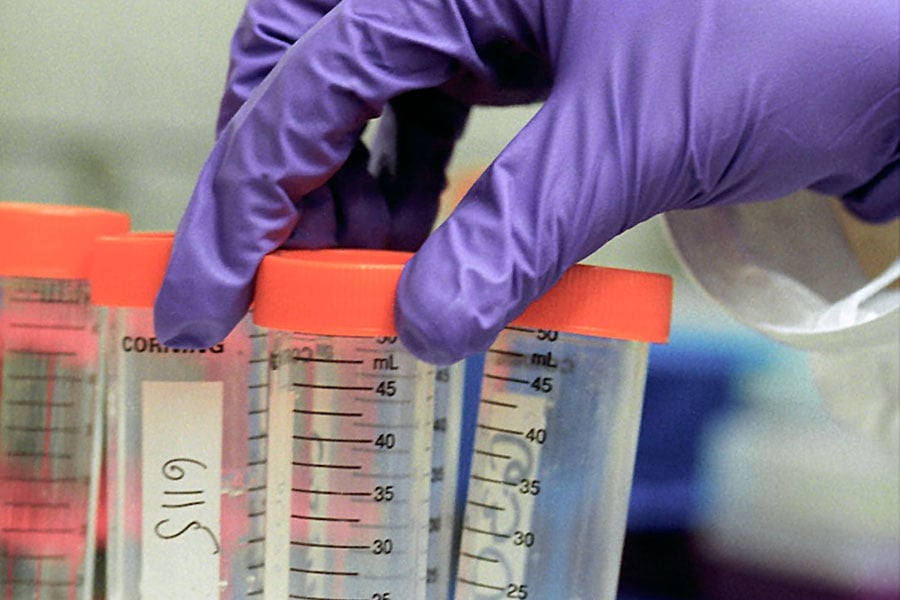So, what's the problem with postmortem conception?

A file photo shows a worker handling test tubes. (OSV News photo/CNS file, Martin Lueders)
During a recent memorial service held at New York's St. Patrick’s Cathedral, the widow of a slain police officer announced that she is expecting a “miracle” baby, conceived via in vitro fertilization (IVF) using sperm harvested from her husband's body shortly after his death. While postmortem conception isn't yet commonplace, similar cases have been reported in Australia, France, the U.K. and across the United States.
These cases tug at our heartstrings. Who are we to tell a grieving widow that she has lost not only her husband, but her chance to bear his child as well? What reason could there be to withhold that solace from her when technology has put it within our grasp?
Amid tragedy, it is natural to want to affirm the goodness of new life. At issue here is the method of reproduction. While life is always a gift, this fact cannot justify any means of conception. Some means honor the dignity of the persons involved, while others, such as laboratory conception or rape, gravely disrespect the human person. This is not to say that people conceived by these means have any less dignity. In fact, quite the opposite: it is precisely because the persons potentially conceived will possess this dignity that they ought to be treated in a manner that befits the human person. Harvesting sperm for postmortem conception (or any postmortem conception, for that matter), violates the dignity of father, mother and child alike.
Postmortem conception fails to respect the father because it fails to respect the dead. Burying the dead is a corporal work of mercy; bodies are to be cared for with proper reverence. Sperm retrieval requires the surgical dissection of the testicles and epididymis within 24-36 hours after death. Unlike organ donation, which restores function to an existing person and becomes a part of an integral whole, harvesting sperm does not save a life. It contributes to the creation of an entirely new person: a fatherless child.
Even if a man consents to this prior to death, say, by having his sperm frozen before beginning cancer treatments, the intentional creation of a fatherless child fails to respect the dignity of that child. As "Donum Vitae" states, a child has the right "to be conceived, carried in the womb, brought into the world and brought up by his own parents." To intentionally create a child outside of this situation "represents an objective failure to meet the obligations of [parental] love, of conjugal fidelity and of responsible [parenthood]” (No. 3).
Postmortem conception also fails to respect the grieving widow. We ought not to dangle a child as a salve for suffering women. Grief is a hard but healthy process with a natural trajectory. While it is natural to want to hold on to our loved ones, children are not coping mechanisms. Reproductive technologies commodify children, offering them as products meant to satisfy parental desires.
We know that children are gifts from God; ultimately they remain his, not ours to possess. As parents we are stewards of the souls God has made for eternal communion with himself. They are born persons, and their existence is their own, not subject to parental whims. When we choose to construct rather than receive them as products of love, we fail in our duty to love them freely.
New technologies have unlatched a Pandora's box of reproductive quandaries, creating unprecedented circumstances and shifting the way we understand the meaning of parenthood and the family. What is meant to reflect God’s deep love and shared life in the Trinity is being dissected, rebranded and sold to the highest bidder. Embryos are the subject of custody battles, implanted experimentally 30 or more years after conception, frozen indefinitely, or else donated to science or simply left to thaw. The dystopian reality of children being genetically made to order is already coming to pass, and lab-grown babies aren't far behind. Some academics are even proposing that we grow babies in the bodies of women in a permanent vegetative state.
We are the only creatures God has made that are so capable of and complicit in our own destruction — of choosing to disfigure the ways in which we image him. It is incumbent upon us as God's sons and daughters to choose to abstain from the exercise of such power, to leave this fruit untouched so that we might better see and understand the authentic life of love and joy God has created for us to live. To choose anything else is to choose that which is lesser.
We might not always see why, but this is our faith. Because we know that God is good, we are called to willingly engage with our portions. Rather than grasping — like Eve — at the things we perceive as being "better" we must recognize ourselves as creatures subject to our Creator, imitating the humility of Mary as we echo, "Let it be."
by Samantha Stephenson, a Catholic wife and homeschooling mother of 4, host of the "Brave New Us" podcast, and author of "Reclaiming Motherhood from a Culture Gone Mad" and the "Mama Prays" Devotional.
